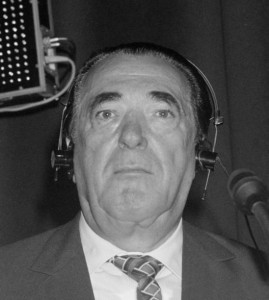On the 19th February, The National Archives released files from the Prime Minister’s Office, covering the years 1986-88. Included in this collection were files relating to the July 1986 Commonwealth Games, held in Edinburgh. The files, totalling over 200 pages are available to download free online, a tiny fraction of the over 80 million documents digitised and published online by The National Archives.
The 1986 games occurred amidst ongoing international condemnation of South Africa’s system of apartheid. The 1977 Gleneagles Agreement signed by Commonwealth heads of government had called on the member states to cease sporting contact with South Africa. In a further bid to force the end of the racist system, in 1985 the Commonwealth imposed economic sanctions on South Africa. Crucially, while the wider Commonwealth championed sanctions, British Prime Minister Margaret Thatcher remained opposed to imposing economic sanctions on South Africa – a decision that increasingly put her at odds with other Commonwealth leaders, particularly the African bloc. It was in this tense atmosphere that the 1986 Games occurred. In the weeks before the games, it appeared the England team would include South African born competitors, the final slight following Thatcher’s less than warm reception of the Commonwealth Eminent Person’s Group’s strong criticism of South Africa. Two weeks before the games began, 32 of the 59 eligible states boycotted the 1986 Commonwealth Games.

Robert Maxwell, the last-minute investor in the 1986 Commonwealth Games. Source: Dutch National Archives, The Hague, Fotocollectie Algemeen Nederlands Persbureau (ANeFo), 1945-1989, Nummer toegang 2.24.01.05 Bestanddeelnummer 934-4359
The newly released National Archives files contain a number of interesting documents, including discussion concerning the debt (over £10 million in today’s currency) incurred by the blighted games and the Thatcher government’s refusal to make up the deficit; the fall from favour of the games’ flamboyant ‘saviour’ Robert Maxwell; official government responses to boycotting countries; and notes to and from the Commonwealth Secretariat.
A number of individuals who appear in the files were also interviewed for the Commonwealth Oral History Project. These include Sir Malcolm Rifkind, then Secretary of State for Scotland, Sir Shridath Ramphall, then Commonwealth Secretary General, Sir Peter Marshall, then Commonwealth Deputy Secretary General and Stuart Mole, then Special Assistant to the Secretary-General. Others involved in this period were also interviewed, including Bob Hawke, then Australian Prime Minister, and RF ‘Pik’ Botha, then South African Minister of Foreign Affairs. All these individuals discussed the tension and behind-the-scenes clashes that marked UK and Commonwealth approaches to South Africa. Sir Peter and Stuart Mole both also discussed the 1986 games at length, including the at times conflicting Commonwealth, UK government and Thatcher motivations, and their impressions of Robert Maxwell who makes up much of the correspondence in the files. The words of those interviewed, like the archival documents, give a sense of the competing interests and the complicated negotiations that took place. Mole remembers the 1986 games as a crucial moment:
‘So, the ’86 Games ended up being a big wakeup call for all sorts of reasons and the very survival of the Commonwealth Games in the future hung in the balance.’
While the newly released files add another dimension to our understanding of this particular period in history, they are no doubt just one part of a larger narrative. It is interesting to note, for example, that the well-publicised events surrounding Michael Shea, then press secretary to the Queen, and the 20th July 1986 Sunday Times article that sent shockwaves across the UK are not mentioned in the files. This omission is notable because interviewees who reflected on the months around the 1986 games invariably mentioned the effect the scandalous article – of which Shea was allegedly the source – had on increasing tension between Thatcher and the Commonwealth. With the effects of the Sunday Times article not discussed in these newly released papers, it appears there is yet more to the story and some material – as always – remains classified. In this case, the oral histories allow us to place the written material within a wider historical context.
